Module 12 Western music Unit 3 Language in use课件(共35张PPT)
文档属性
| 名称 | Module 12 Western music Unit 3 Language in use课件(共35张PPT) |
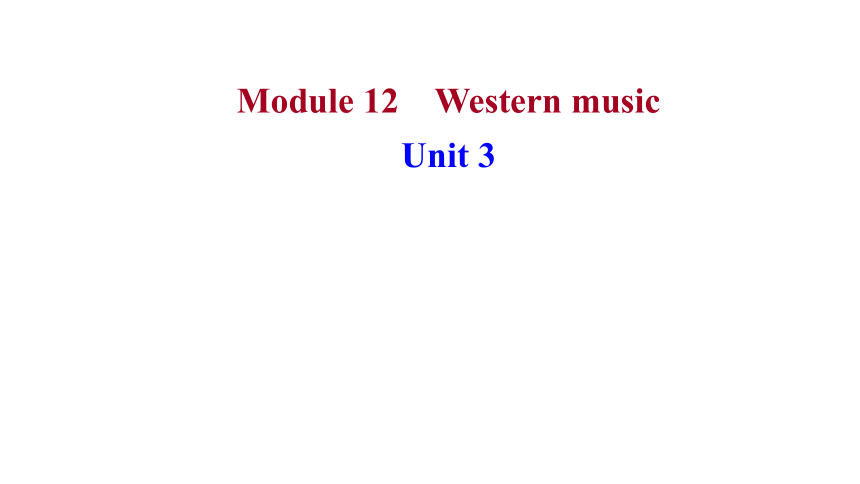
|
|
| 格式 | ppt | ||
| 文件大小 | 447.5KB | ||
| 资源类型 | 教案 | ||
| 版本资源 | 外研版 | ||
| 科目 | 英语 | ||
| 更新时间 | 2022-06-09 00:00:00 | ||
图片预览

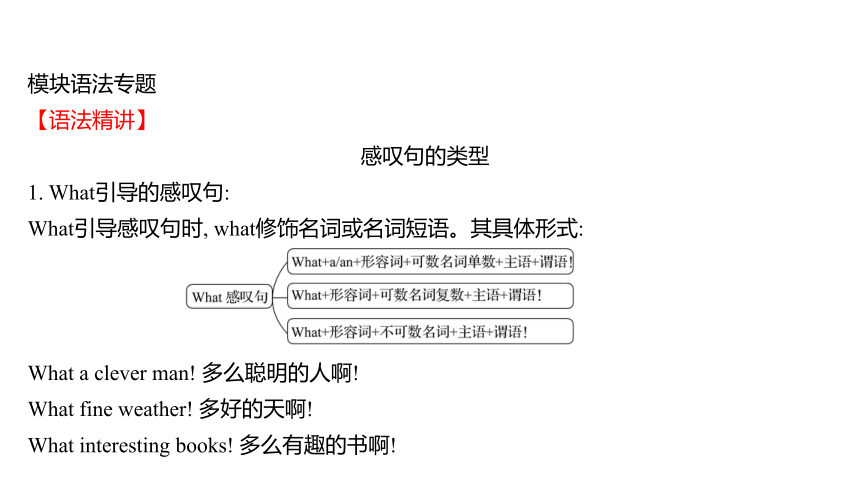
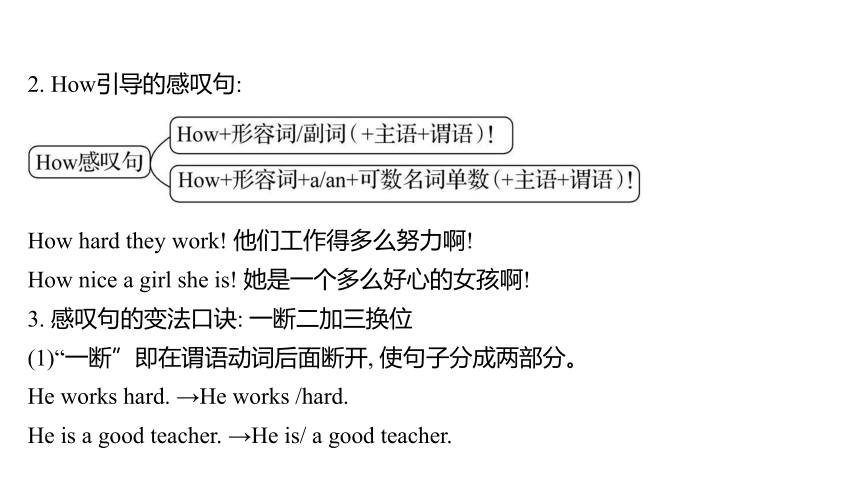


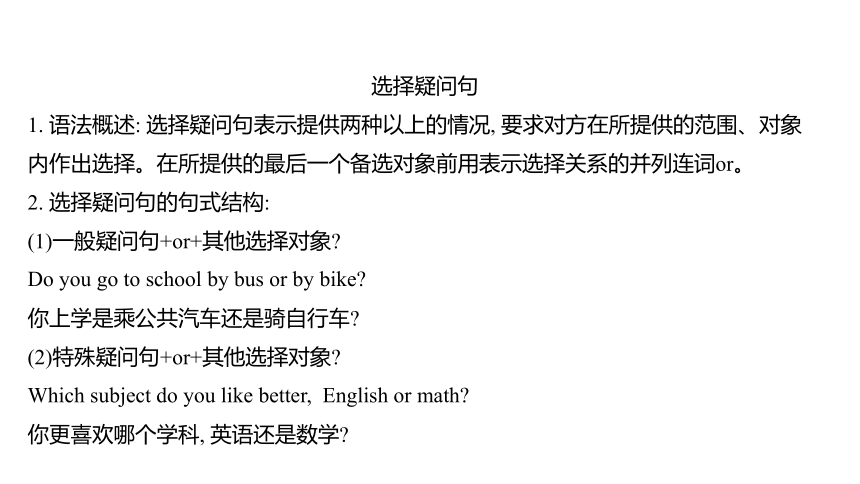
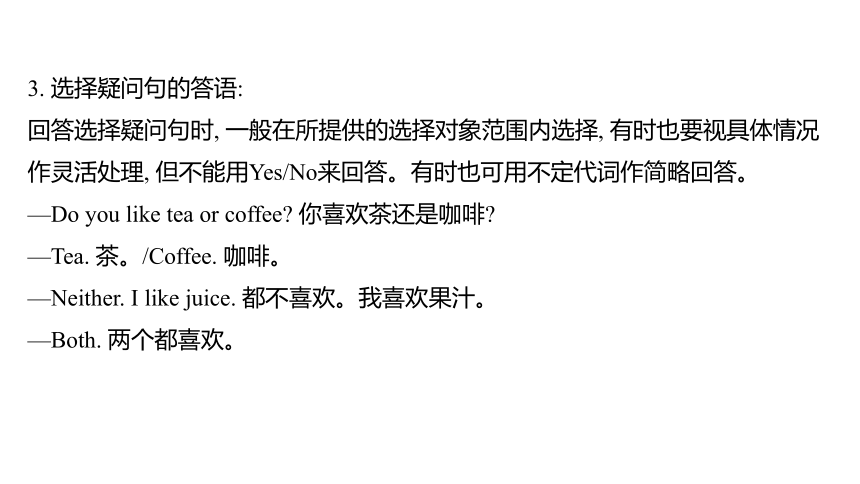
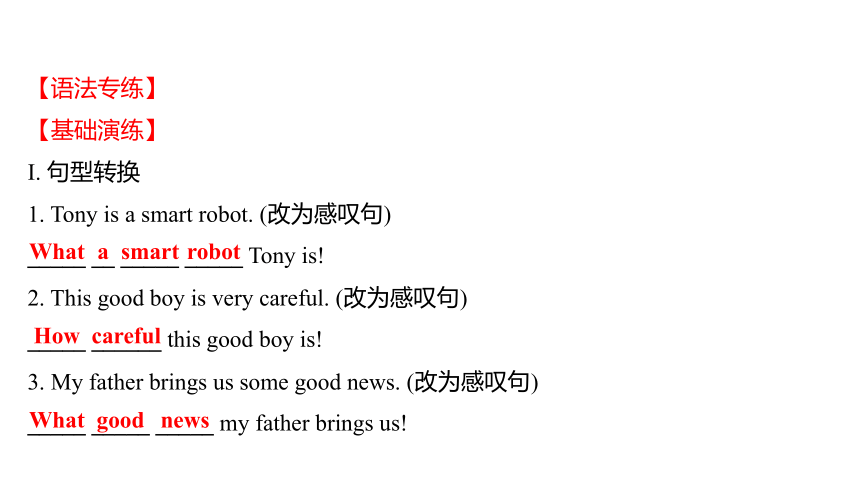
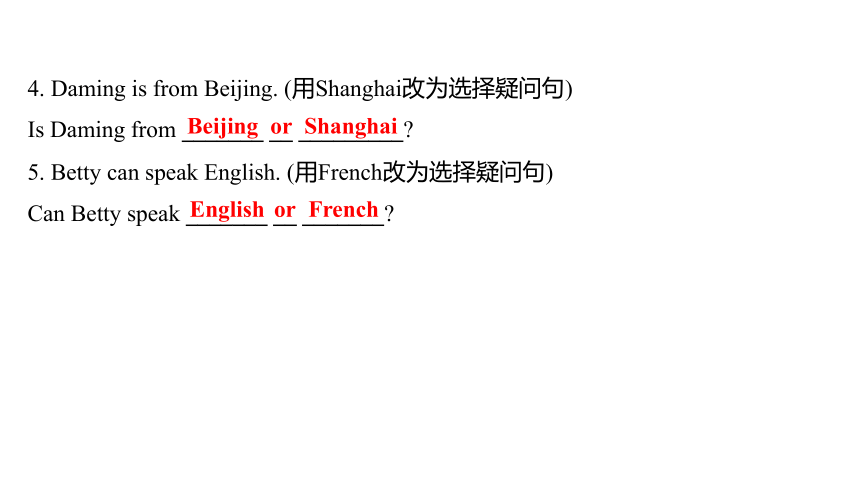
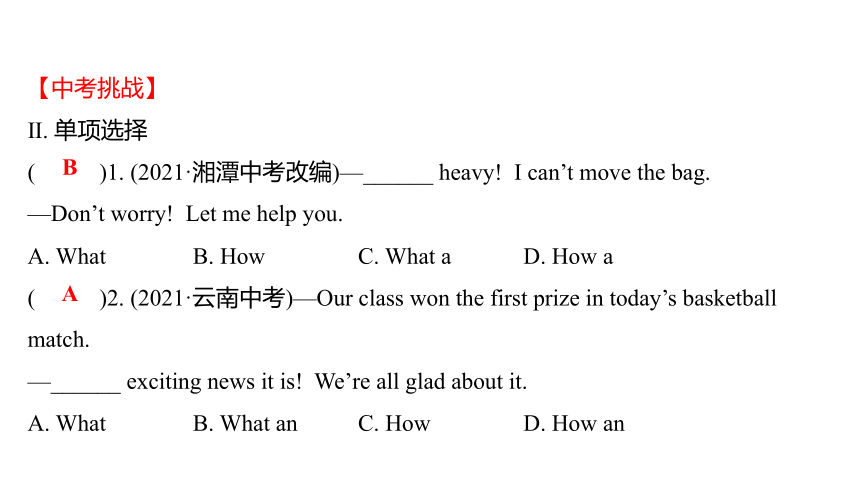
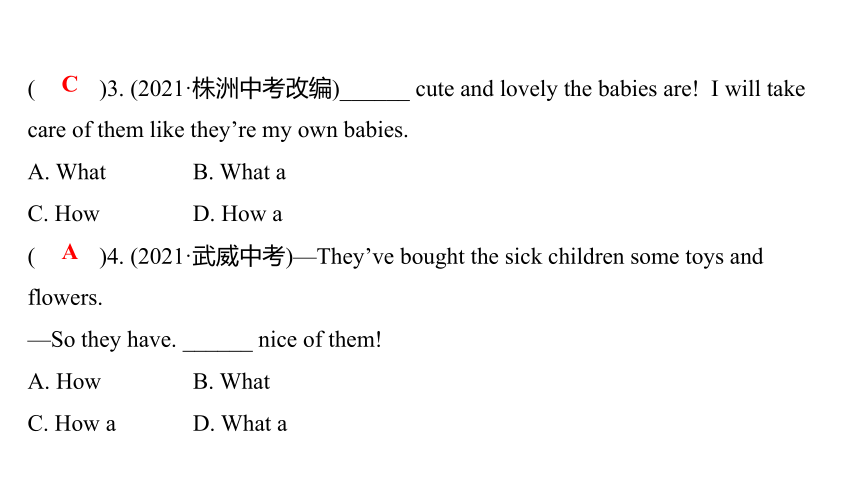
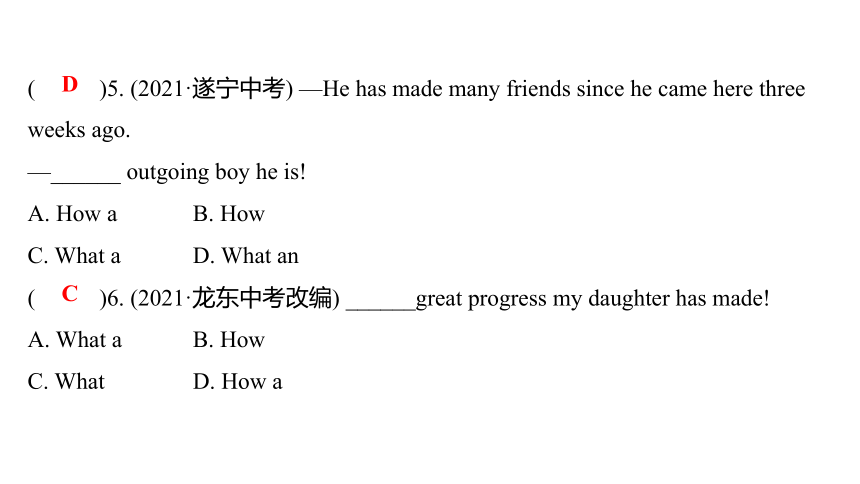
文档简介
(共35张PPT)
Module 12 Western music
Unit 3
模块语法专题
【语法精讲】
感叹句的类型
1. What引导的感叹句:
What引导感叹句时, what修饰名词或名词短语。其具体形式:
What a clever man! 多么聪明的人啊!
What fine weather! 多好的天啊!
What interesting books! 多么有趣的书啊!
2. How引导的感叹句:
How hard they work! 他们工作得多么努力啊!
How nice a girl she is! 她是一个多么好心的女孩啊!
3. 感叹句的变法口诀: 一断二加三换位
(1)“一断”即在谓语动词后面断开, 使句子分成两部分。
He works hard. →He works /hard.
He is a good teacher. →He is/ a good teacher.
(2)“二加”即在第二部分前面加上what(强调名词或名词短语)或how(强调形容词或副词)。
He works /(how) hard.
He is/ (what) a good teacher.
(3)“三换位”即把第一部分和第二部分互换位置, 句号换成感叹号(注意单词首字母大小写的变化)。
How hard he works!
What a good teacher he is!
【巧学妙记】
感叹句, 并不难, what与how应在前。
形副跟着how, what名词连。
名词若是可数单, 前带冠词a或an。
主语、谓语放后面, 省略它们很常见。
选择疑问句
1. 语法概述: 选择疑问句表示提供两种以上的情况, 要求对方在所提供的范围、对象内作出选择。在所提供的最后一个备选对象前用表示选择关系的并列连词or。
2. 选择疑问句的句式结构:
(1)一般疑问句+or+其他选择对象
Do you go to school by bus or by bike
你上学是乘公共汽车还是骑自行车
(2)特殊疑问句+or+其他选择对象
Which subject do you like better, English or math
你更喜欢哪个学科, 英语还是数学
3. 选择疑问句的答语:
回答选择疑问句时, 一般在所提供的选择对象范围内选择, 有时也要视具体情况作灵活处理, 但不能用Yes/No来回答。有时也可用不定代词作简略回答。
—Do you like tea or coffee 你喜欢茶还是咖啡
—Tea. 茶。/Coffee. 咖啡。
—Neither. I like juice. 都不喜欢。我喜欢果汁。
—Both. 两个都喜欢。
【语法专练】
【基础演练】
Ⅰ. 句型转换
1. Tony is a smart robot. (改为感叹句)
_____ __ _____ _____ Tony is!
2. This good boy is very careful. (改为感叹句)
_____ ______ this good boy is!
3. My father brings us some good news. (改为感叹句)
_____ _____ _____ my father brings us!
What
a
smart
robot
How
careful
What
good
news
4. Daming is from Beijing. (用Shanghai改为选择疑问句)
Is Daming from _______ __ _________
5. Betty can speak English. (用French改为选择疑问句)
Can Betty speak _______ __ _______
Beijing
or
Shanghai
English
or
French
【中考挑战】
Ⅱ. 单项选择
( )1. (2021·湘潭中考改编)—______ heavy! I can’t move the bag.
—Don’t worry! Let me help you.
A. What B. How C. What a D. How a
( )2. (2021·云南中考)—Our class won the first prize in today’s basketball
match.
—______ exciting news it is! We’re all glad about it.
A. What B. What an C. How D. How an
B
A
( )3. (2021·株洲中考改编)______ cute and lovely the babies are! I will take
care of them like they’re my own babies.
A. What B. What a
C. How D. How a
( )4. (2021·武威中考)—They’ve bought the sick children some toys and
flowers.
—So they have. ______ nice of them!
A. How B. What
C. How a D. What a
C
A
( )5. (2021·遂宁中考) —He has made many friends since he came here three
weeks ago.
—______ outgoing boy he is!
A. How a B. How
C. What a D. What an
( )6. (2021·龙东中考改编) ______great progress my daughter has made!
A. What a B. How
C. What D. How a
D
C
话题写作专题
【话题剖析】
话题 以“西方音乐”为话题, 介绍西方古典音乐及其音乐家
考查内容 通过介绍不同类型的音乐及著名音乐家, 使学生学会
描述自己喜欢的音乐
写作注意事项 1. 要掌握一般过去时的运用;
2. 多以时间顺序展开, 描述名人的成长经历及所取得
的成就
【语用储备】
读·教材佳句
1. This is Western music, isn’t it
2. He was born in Vienna.
3. Do you like traditional Western music or pop music, Betty
4. It’s the capital city of Austria and the centre of European classical music.
5. His dance music made him famous all over Europe.
仿·万能句式
1. 他是一个伟大的作曲家, 不是吗
______________________________
2. 他出生于一个小村庄。
___________________________
3. 你喜欢英语还是语文
_____________________________
4. 在我们城市的中心有一个公园。
__________________________________
He is a great composer, isn’t he
He was born in a small village.
Do you like English or Chinese
There is a park in the centre of our city.
【类题仿写】
你知道被称为“圆舞曲之王”的约翰·施特劳斯吗 下面是有关他的一些资料, 请你根据提示写一篇短文介绍一下这位著名的音乐家。要求: 书写工整, 字迹清楚, 语言通顺。提示如下:
1. 约翰·施特劳斯是奥地利(Austria)著名的作曲家;
2. 他出生于1825年并于1899年去世;
3. 他出生于一个小提琴之家, 7岁便开始创作圆舞曲;
4. 写了四百多首乐曲, 包括圆舞曲——《蓝色多瑙河》(“Blue Danube”);
5. 施特劳斯被人们称为“圆舞曲之王”。
【考场·答题流程】
Step 1: “五定”审题
定体裁 ①______ 定人称 ②第__人称
定时态 ③以_________为主
定要点
定结构 ④总起说明
⑤说明人物历程
⑥总结人物评价
记叙文
三
一般过去时
Step 2: “三段”谋篇
第一段: 点明主题
1. (老约翰·施特劳斯的)儿子, 小约翰·施特劳斯, 是奥地利著名的作曲家。
(composer)
_____________________________________________________________
第二段: 讲述人物的历程。
2. 他出生于1825年, 死于1899年。(be born)
_________________________________
3. 他从小就喜欢音乐。(since)
___________________________________
The son, Johann Strauss the younger, is an Austria famous composer.
He was born in 1825 and died in 1899.
He liked music since he was a little child.
4. 7岁时, 他开始写他的圆舞曲。(Waltzes)
_________________________________________
5. 他一生创作了400多首音乐作品。(pieces of)
____________________________________________
第三段: 对人物作出评价。
6. 老约翰·施特劳斯被称为“圆舞曲之父”, 儿子被称为“圆舞曲之王”。(king of
waltz)
__________________________________________________________________
_________________
At the age of 7, he began to write his Waltzes.
He wrote more than 400 pieces of music in his life.
Old John Strauss was called the “father of the waltz”. The son was known as
the “king of waltz”.
Step 3: 完美成篇
__________________________________________________________________
__________________________________________________________________
__________________________________________________________________
【参考范文】
A Famous Composer
The son, Johann Strauss the younger, is an Austria famous composer.
He was born in 1825 and died in 1899. He was born in a violin family. He liked music since he was a little child. At the age of 7, he began to write his Waltzes. He wrote more than 400 pieces of music in his life, including waltz—“Blue Danube”. These works are beautiful and full of life. Johann Strauss and his father are of the same name.
Old Johann Strauss was called the “father of the waltz”. The son was known as the “king of waltz”.
易错易混练
易错点1: lively, live, alive与living的用法
( )①Shenzhen is a ______city and it is becoming more and more beautiful.
A. live B. lively C. living D. alive
( )②Tony wanted to keep the fish ______and he doesn’t kill it .
A. live B. lively C. living D. alive
( )③My first teacher is still______ and I often go to visit her during summer
holiday .
A. live B. lively C. living D. alive
( )④My grandfather______ in a small mountain village alone.
A. lives B. lively C. living D. alive
B
D
C
A
【易错归纳】
1. live作动词, 意为“居住”, 后接介词in, live in sw. 居住在某地。
2. lively作形容词, 意为“活泼的”, 常作表语或定语。alive作形容词, 意为“活着的”, 作表语用, 如果用作定语, 需要放在名词之后。
3. living作形容词, 意为“活着的”, 与dead相对。
易错点2: another与other的区别
( )①We should tell the truth. We can’t say one thing to one person and
______thing to someone else.
A. other B. another C. the other D. one more
( )②—If you like the red evening dress, you’ll have to pay ______30 dollars,
because it’s made of silk.
—OK. Here you are.
A. other B. the other
C. more D. another
B
D
( )③—I’m afraid that I can’t take a walk with you today, Jack. Maybe
______time.
—What a pity!
A. another B. other
C. the other D. others
【易错归纳】
1. “another”是对已经指定或已知的同一类型或不同类型的人或物的附加。
2. “other”用于表示与已经指定或已知的人或事物不同的人或事物。other修饰名
词时要放在名词前。
A
综合能力练
Ⅰ. 判断正误
Gofa is an Englishman. He loved Bruce Lee’s films when he was a little boy. He always dreamed of visiting China one day. In 1993, Gofa saw a Beijing opera show(演出) for the first time in London. The English young man loved it and he decided to come to China to learn it.
Gofa came to China to learn Beijing opera in winter in 1993. He was 32 years old then, but he still studied together with other Chinese kids. He studied very hard. Several years later, Gofa wanted to play the Monkey King, a very popular character in Chinese culture. He spent lots of time searching for information about the Monkey King. He practiced a lot. Now many people can see this foreign Monkey King’s show.
Gofa often shows Beijing opera in England, America and other foreign
countries. He always translates(翻译) plays into English, so foreigners can
understand(理解) it, He wants more people to know about Beijing Opera.
根据语篇内容, 判断下列句子正(T)误(F)。
( )1. In 1993, Gofa saw a Beijing opera show for the first time.
( )2. Gofa studied Beijing opera with his Chinese teacher.
( )3. He spent lots of time searching for information about the Monkey King.
( )4. Gofa gives shows in English to let foreigners understand Beijing opera.
( )5. This passage tells us a foreign Beijing opera lover.
T
F
T
T
T
Ⅱ. 阅读理解
A
Wolfgang Amadeus Mozart was an important composer. Mozart had a sister, Maria Anna. She learned the piano from her father. When Mozart was three, he always listened to Anna’s playing. He would try to play the piano with his small fingers. His father noticed that Mozart could remember lots of music. So when Mozart was four, he also learned the piano from his father.
Mozart was very careful about playing. When he took lessons, he didn’t want anyone to talk to him. When he was busy with his music, he always put his mind on it.
Their father loved his children and often played with them. He liked the violin best, so little Mozart also had violin lessons every day. When Mozart was about six, his father took him and Anna on a concert tour.
Many people wanted to hear Mozart’s playing. They all loved his music. He was very happy that so many people loved his music.
Mozart kept on writing for the piano, the violin and the opera. He made many great pieces of music.
( )1. Who taught Mozart to play the piano at first
A. His teacher. B. His father.
C. His mother. D. His sister.
( )2. Why does the writer say Mozart was careful about music
A. He often didn’t remember to talk to people when he took lessons.
B. He would only think about music when he worked on music.
C. He could write many pieces of music in a short time.
D. No one could find him when he was busy with music.
( )3. The underlined word“mind” in Paragraph 2 means ______in Chinese.
A. 心思 B. 菜单 C. 音乐 D. 演唱
B
B
A
( )4. Mozart also learned to play the violin, because it was ______.
A. easy to play the violin B. a need for every musician
C. his father’s favourite D. very popular at that time
( )5. Which of the following is TRUE according to the passage
A. Mozart began to take the music lessons at the age of four.
B. Mozart began his concert tour when he was seven.
C. Mozart was very happy that many people liked his father’s music.
D. Mozart only wrote pieces of music for the piano and the opera.
C
A
B
Music is part of all children’s lives. Even at an early age children move their hands when they hear music. Children from 18 months to 3 years like short songs. They can remember only a few words at a time. Singing songs encourages (鼓励) the use of words.
Many little children sing to themselves as they play. Older children dance to their favourite music. And some of them use music to make friends and share feelings. For most children, singing is like talking. Children learn to sing like they learn to talk. You will not have to teach the children how to sing. If you feel good about your music, try to teach them carefully. That will help them to learn how to work with others and learn better. Teaching them how to play musical instruments will help them be more confident (自信的).
People use music in plays, on television and in movies. Music can help teach about culture and help teach children.
根据材料内容选择最佳答案。
( )6. At an early age children ______when they hear music.
A. learn to sing B. move their hands
C. want to sleep D. remember all words
( )7. Children from ______love short songs.
A. eighteen months to three years
B. eighteen months to six years
C. six months to six years
D. three months to six years
B
A
( )8. Singing is like ______for most children.
A. listening B. writing
C. reading D. talking
( )9. Teaching children how to play musical instruments can help them______.
A. work better with others
B. learn something better
C. be more confident
D. sing songs well
D
C
( )10. Which of the following is NOT true according to the passage
A. People seldom use music in plays.
B. Music can help teach about culture.
C. People can use music in many ways.
D. Music can help children make friends.
A
Module 12 Western music
Unit 3
模块语法专题
【语法精讲】
感叹句的类型
1. What引导的感叹句:
What引导感叹句时, what修饰名词或名词短语。其具体形式:
What a clever man! 多么聪明的人啊!
What fine weather! 多好的天啊!
What interesting books! 多么有趣的书啊!
2. How引导的感叹句:
How hard they work! 他们工作得多么努力啊!
How nice a girl she is! 她是一个多么好心的女孩啊!
3. 感叹句的变法口诀: 一断二加三换位
(1)“一断”即在谓语动词后面断开, 使句子分成两部分。
He works hard. →He works /hard.
He is a good teacher. →He is/ a good teacher.
(2)“二加”即在第二部分前面加上what(强调名词或名词短语)或how(强调形容词或副词)。
He works /(how) hard.
He is/ (what) a good teacher.
(3)“三换位”即把第一部分和第二部分互换位置, 句号换成感叹号(注意单词首字母大小写的变化)。
How hard he works!
What a good teacher he is!
【巧学妙记】
感叹句, 并不难, what与how应在前。
形副跟着how, what名词连。
名词若是可数单, 前带冠词a或an。
主语、谓语放后面, 省略它们很常见。
选择疑问句
1. 语法概述: 选择疑问句表示提供两种以上的情况, 要求对方在所提供的范围、对象内作出选择。在所提供的最后一个备选对象前用表示选择关系的并列连词or。
2. 选择疑问句的句式结构:
(1)一般疑问句+or+其他选择对象
Do you go to school by bus or by bike
你上学是乘公共汽车还是骑自行车
(2)特殊疑问句+or+其他选择对象
Which subject do you like better, English or math
你更喜欢哪个学科, 英语还是数学
3. 选择疑问句的答语:
回答选择疑问句时, 一般在所提供的选择对象范围内选择, 有时也要视具体情况作灵活处理, 但不能用Yes/No来回答。有时也可用不定代词作简略回答。
—Do you like tea or coffee 你喜欢茶还是咖啡
—Tea. 茶。/Coffee. 咖啡。
—Neither. I like juice. 都不喜欢。我喜欢果汁。
—Both. 两个都喜欢。
【语法专练】
【基础演练】
Ⅰ. 句型转换
1. Tony is a smart robot. (改为感叹句)
_____ __ _____ _____ Tony is!
2. This good boy is very careful. (改为感叹句)
_____ ______ this good boy is!
3. My father brings us some good news. (改为感叹句)
_____ _____ _____ my father brings us!
What
a
smart
robot
How
careful
What
good
news
4. Daming is from Beijing. (用Shanghai改为选择疑问句)
Is Daming from _______ __ _________
5. Betty can speak English. (用French改为选择疑问句)
Can Betty speak _______ __ _______
Beijing
or
Shanghai
English
or
French
【中考挑战】
Ⅱ. 单项选择
( )1. (2021·湘潭中考改编)—______ heavy! I can’t move the bag.
—Don’t worry! Let me help you.
A. What B. How C. What a D. How a
( )2. (2021·云南中考)—Our class won the first prize in today’s basketball
match.
—______ exciting news it is! We’re all glad about it.
A. What B. What an C. How D. How an
B
A
( )3. (2021·株洲中考改编)______ cute and lovely the babies are! I will take
care of them like they’re my own babies.
A. What B. What a
C. How D. How a
( )4. (2021·武威中考)—They’ve bought the sick children some toys and
flowers.
—So they have. ______ nice of them!
A. How B. What
C. How a D. What a
C
A
( )5. (2021·遂宁中考) —He has made many friends since he came here three
weeks ago.
—______ outgoing boy he is!
A. How a B. How
C. What a D. What an
( )6. (2021·龙东中考改编) ______great progress my daughter has made!
A. What a B. How
C. What D. How a
D
C
话题写作专题
【话题剖析】
话题 以“西方音乐”为话题, 介绍西方古典音乐及其音乐家
考查内容 通过介绍不同类型的音乐及著名音乐家, 使学生学会
描述自己喜欢的音乐
写作注意事项 1. 要掌握一般过去时的运用;
2. 多以时间顺序展开, 描述名人的成长经历及所取得
的成就
【语用储备】
读·教材佳句
1. This is Western music, isn’t it
2. He was born in Vienna.
3. Do you like traditional Western music or pop music, Betty
4. It’s the capital city of Austria and the centre of European classical music.
5. His dance music made him famous all over Europe.
仿·万能句式
1. 他是一个伟大的作曲家, 不是吗
______________________________
2. 他出生于一个小村庄。
___________________________
3. 你喜欢英语还是语文
_____________________________
4. 在我们城市的中心有一个公园。
__________________________________
He is a great composer, isn’t he
He was born in a small village.
Do you like English or Chinese
There is a park in the centre of our city.
【类题仿写】
你知道被称为“圆舞曲之王”的约翰·施特劳斯吗 下面是有关他的一些资料, 请你根据提示写一篇短文介绍一下这位著名的音乐家。要求: 书写工整, 字迹清楚, 语言通顺。提示如下:
1. 约翰·施特劳斯是奥地利(Austria)著名的作曲家;
2. 他出生于1825年并于1899年去世;
3. 他出生于一个小提琴之家, 7岁便开始创作圆舞曲;
4. 写了四百多首乐曲, 包括圆舞曲——《蓝色多瑙河》(“Blue Danube”);
5. 施特劳斯被人们称为“圆舞曲之王”。
【考场·答题流程】
Step 1: “五定”审题
定体裁 ①______ 定人称 ②第__人称
定时态 ③以_________为主
定要点
定结构 ④总起说明
⑤说明人物历程
⑥总结人物评价
记叙文
三
一般过去时
Step 2: “三段”谋篇
第一段: 点明主题
1. (老约翰·施特劳斯的)儿子, 小约翰·施特劳斯, 是奥地利著名的作曲家。
(composer)
_____________________________________________________________
第二段: 讲述人物的历程。
2. 他出生于1825年, 死于1899年。(be born)
_________________________________
3. 他从小就喜欢音乐。(since)
___________________________________
The son, Johann Strauss the younger, is an Austria famous composer.
He was born in 1825 and died in 1899.
He liked music since he was a little child.
4. 7岁时, 他开始写他的圆舞曲。(Waltzes)
_________________________________________
5. 他一生创作了400多首音乐作品。(pieces of)
____________________________________________
第三段: 对人物作出评价。
6. 老约翰·施特劳斯被称为“圆舞曲之父”, 儿子被称为“圆舞曲之王”。(king of
waltz)
__________________________________________________________________
_________________
At the age of 7, he began to write his Waltzes.
He wrote more than 400 pieces of music in his life.
Old John Strauss was called the “father of the waltz”. The son was known as
the “king of waltz”.
Step 3: 完美成篇
__________________________________________________________________
__________________________________________________________________
__________________________________________________________________
【参考范文】
A Famous Composer
The son, Johann Strauss the younger, is an Austria famous composer.
He was born in 1825 and died in 1899. He was born in a violin family. He liked music since he was a little child. At the age of 7, he began to write his Waltzes. He wrote more than 400 pieces of music in his life, including waltz—“Blue Danube”. These works are beautiful and full of life. Johann Strauss and his father are of the same name.
Old Johann Strauss was called the “father of the waltz”. The son was known as the “king of waltz”.
易错易混练
易错点1: lively, live, alive与living的用法
( )①Shenzhen is a ______city and it is becoming more and more beautiful.
A. live B. lively C. living D. alive
( )②Tony wanted to keep the fish ______and he doesn’t kill it .
A. live B. lively C. living D. alive
( )③My first teacher is still______ and I often go to visit her during summer
holiday .
A. live B. lively C. living D. alive
( )④My grandfather______ in a small mountain village alone.
A. lives B. lively C. living D. alive
B
D
C
A
【易错归纳】
1. live作动词, 意为“居住”, 后接介词in, live in sw. 居住在某地。
2. lively作形容词, 意为“活泼的”, 常作表语或定语。alive作形容词, 意为“活着的”, 作表语用, 如果用作定语, 需要放在名词之后。
3. living作形容词, 意为“活着的”, 与dead相对。
易错点2: another与other的区别
( )①We should tell the truth. We can’t say one thing to one person and
______thing to someone else.
A. other B. another C. the other D. one more
( )②—If you like the red evening dress, you’ll have to pay ______30 dollars,
because it’s made of silk.
—OK. Here you are.
A. other B. the other
C. more D. another
B
D
( )③—I’m afraid that I can’t take a walk with you today, Jack. Maybe
______time.
—What a pity!
A. another B. other
C. the other D. others
【易错归纳】
1. “another”是对已经指定或已知的同一类型或不同类型的人或物的附加。
2. “other”用于表示与已经指定或已知的人或事物不同的人或事物。other修饰名
词时要放在名词前。
A
综合能力练
Ⅰ. 判断正误
Gofa is an Englishman. He loved Bruce Lee’s films when he was a little boy. He always dreamed of visiting China one day. In 1993, Gofa saw a Beijing opera show(演出) for the first time in London. The English young man loved it and he decided to come to China to learn it.
Gofa came to China to learn Beijing opera in winter in 1993. He was 32 years old then, but he still studied together with other Chinese kids. He studied very hard. Several years later, Gofa wanted to play the Monkey King, a very popular character in Chinese culture. He spent lots of time searching for information about the Monkey King. He practiced a lot. Now many people can see this foreign Monkey King’s show.
Gofa often shows Beijing opera in England, America and other foreign
countries. He always translates(翻译) plays into English, so foreigners can
understand(理解) it, He wants more people to know about Beijing Opera.
根据语篇内容, 判断下列句子正(T)误(F)。
( )1. In 1993, Gofa saw a Beijing opera show for the first time.
( )2. Gofa studied Beijing opera with his Chinese teacher.
( )3. He spent lots of time searching for information about the Monkey King.
( )4. Gofa gives shows in English to let foreigners understand Beijing opera.
( )5. This passage tells us a foreign Beijing opera lover.
T
F
T
T
T
Ⅱ. 阅读理解
A
Wolfgang Amadeus Mozart was an important composer. Mozart had a sister, Maria Anna. She learned the piano from her father. When Mozart was three, he always listened to Anna’s playing. He would try to play the piano with his small fingers. His father noticed that Mozart could remember lots of music. So when Mozart was four, he also learned the piano from his father.
Mozart was very careful about playing. When he took lessons, he didn’t want anyone to talk to him. When he was busy with his music, he always put his mind on it.
Their father loved his children and often played with them. He liked the violin best, so little Mozart also had violin lessons every day. When Mozart was about six, his father took him and Anna on a concert tour.
Many people wanted to hear Mozart’s playing. They all loved his music. He was very happy that so many people loved his music.
Mozart kept on writing for the piano, the violin and the opera. He made many great pieces of music.
( )1. Who taught Mozart to play the piano at first
A. His teacher. B. His father.
C. His mother. D. His sister.
( )2. Why does the writer say Mozart was careful about music
A. He often didn’t remember to talk to people when he took lessons.
B. He would only think about music when he worked on music.
C. He could write many pieces of music in a short time.
D. No one could find him when he was busy with music.
( )3. The underlined word“mind” in Paragraph 2 means ______in Chinese.
A. 心思 B. 菜单 C. 音乐 D. 演唱
B
B
A
( )4. Mozart also learned to play the violin, because it was ______.
A. easy to play the violin B. a need for every musician
C. his father’s favourite D. very popular at that time
( )5. Which of the following is TRUE according to the passage
A. Mozart began to take the music lessons at the age of four.
B. Mozart began his concert tour when he was seven.
C. Mozart was very happy that many people liked his father’s music.
D. Mozart only wrote pieces of music for the piano and the opera.
C
A
B
Music is part of all children’s lives. Even at an early age children move their hands when they hear music. Children from 18 months to 3 years like short songs. They can remember only a few words at a time. Singing songs encourages (鼓励) the use of words.
Many little children sing to themselves as they play. Older children dance to their favourite music. And some of them use music to make friends and share feelings. For most children, singing is like talking. Children learn to sing like they learn to talk. You will not have to teach the children how to sing. If you feel good about your music, try to teach them carefully. That will help them to learn how to work with others and learn better. Teaching them how to play musical instruments will help them be more confident (自信的).
People use music in plays, on television and in movies. Music can help teach about culture and help teach children.
根据材料内容选择最佳答案。
( )6. At an early age children ______when they hear music.
A. learn to sing B. move their hands
C. want to sleep D. remember all words
( )7. Children from ______love short songs.
A. eighteen months to three years
B. eighteen months to six years
C. six months to six years
D. three months to six years
B
A
( )8. Singing is like ______for most children.
A. listening B. writing
C. reading D. talking
( )9. Teaching children how to play musical instruments can help them______.
A. work better with others
B. learn something better
C. be more confident
D. sing songs well
D
C
( )10. Which of the following is NOT true according to the passage
A. People seldom use music in plays.
B. Music can help teach about culture.
C. People can use music in many ways.
D. Music can help children make friends.
A
同课章节目录
- Module 1 Lost and found
- Unit 1 Whose bag is this?
- Unit 2 Are they yours?
- Unit 3 Language in use
- Module 2 What can you do ?
- Unit 1 I can play the piano
- Unit 2 I can run really fast
- Unit 3 Language in use
- Module 3 Making plans
- Unit 1 What are you going to do at the weekends?
- Unit 2 We're going to cheer the players.
- Unit 3 Language in use
- Module 4 Life in the future
- Unit 1 Everyone will study at home
- Unit 2 Every family will have a small plane.
- Unit 3 Language in use
- Module 5 Shopping
- Unit 1 What can I do for you?
- Unit 2 You can buy everything on the Internet
- Unit 3 Language in use
- Module 6 Around town
- Unit 1 Could you tell me how to get to the Nationa
- Unit 2 The London Eye is on your right.
- Unit 3 Language in use
- Revision module A
- Module 7 My past life
- Unit 1 I was born in a small village.
- Unit 2 I was born in Quincy.
- Unit 3 Language in use
- Module 8 Story time
- Unit 1 Once upon a time….
- Unit 2 Goldilocks hurried out of the house.
- Unit 3 Language in use
- Module 9 Life history
- Unit 1 He left school and began work at the age of
- Unit 2 He decided to be an actor.
- Unit 3 Language in use
- Module 10 A holiday journey
- Unit 1 What did you do?
- Unit 2 This morning we took a walk.
- Unit 3 Language in use
- Module 11 Body language
- Unit 1 They touch noses!
- Unit 2 Here are some ways to welcome them.
- Unit 3 Language in use
- Module 12 Western music
- Unit 1 It's so beautiful!
- Unit 2 Vienna is the centre of European classical
- Unit 3 Language in use
- Revision module B
